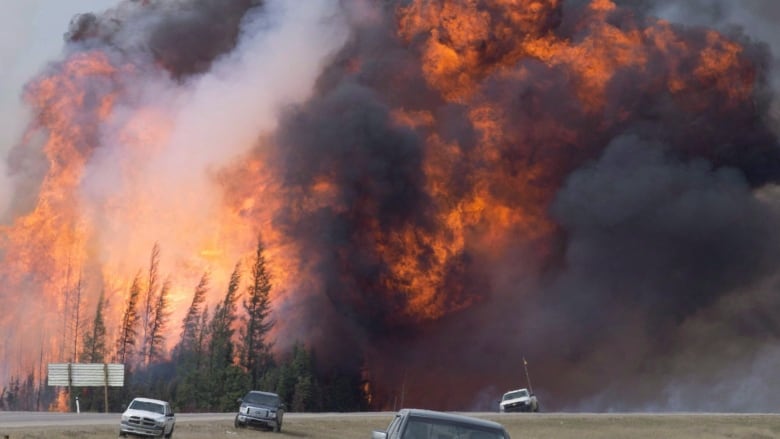Alberta estimates wildfire put $1B dent in 2016 oilsands spending plans
Top economist says plans are deferred, not cancelled

Alberta wildfires that swept through Fort McMurray in May have resulted in the loss of $1 billion in planned capital spending in the oilsands for 2016, according to Alberta's chief energy economist.
Matt Foss said Wednesday that he believes those plans are deferred, not cancelled. But he doesn't know when or if companies will resume their spending given benchmark oil prices that remain below break- even levels.
Foss said the interruptions have dropped expected oilsands spending in the current year to $18.5 billion from $19.5 billion estimated in the province's spring budget.
- Oilwell drilling rate at lowest level since 1977, industry group says
- Ottawa and its Alberta problem: Federal government keeps a close eye on province's economy
- Local, regional economic initiatives to get $30M in grants from province
- Alberta economy still the best in Canada by some measures
"The majority of them were expansions to existing projects," he told reporters on the sidelines of a heavy oil conference in Calgary.
"It interrupted the logistics chain for them such that their ability to deploy workforce ... over those months was no longer available and then the rebuild effort around Fort McMurray has them just hitting pause for the moment. Hopefully, they will resume here later this year or early next year."
Foss said lower costs have reduced the West Texas Intermediate price at which oilsands expansion projects make money by about $10 per barrel to between $50 US and $60 per barrelbut that's still higher than current prices in the mid-$40s.
'We'll learn from it'
Saskatchewan continues to be an industry defender, the province's energy minister said, despite a Husky pipeline oil spill that leaked 250,000 litres of oil and solvent in the North Saskatchewan River in July.
"We'll learn from it," Dustin Duncan said Wednesday.
"We, like you, have made the safe and responsible transport of oil a priority and we'll learn from this event to continue to improve the high safety standards the people of Canada have come to expect. But make no mistake, in Saskatchewan we'll continue to be defenders of this industry and the jobs that it produces. We'll continue to defend the responsible, safe expansion of pipeline to ensure that we can sustain economic momentum and benefits and the benefits that it provides to the people of our province and to the people of this country."
Duncan added his province opposes a carbon tax.
Figures provided by the oilsands companies to the province show that about $800 million scheduled to be spent in May and June did not take place due to the upheaval in workforce availability and construction logistics caused by the fire, said Foss. Although little damage was done to the projects themselves, rebuilding in the city has continued to cause disruptions, he added.
'Deferral, not cancellation'
Oilsands analyst Michael Dunn of FirstEnergy Capital said the wildfires affected progress on major oilsands projects under construction such as Suncor Energy's Fort Hills oilsands mine, but he expects any capital spending decline to be a deferral, not a cancellation, in those cases.
Alberta oilsands production in May dropped by about one million barrelsper day (bpd) in May, Foss estimated, and by about 700,000 bpd in June. At full capacity, Canada's oilsands industry produces about 2.5 million bpd.
One of Alberta's oldest thermal oilsands projects was forced to shut down during the wildfires and has not reopened. Officials with Japan Canada Oil Sands say their Hangingstone project will remain closed until benchmark oil prices improve to above $50 US per barrel.
With files from CBC's Allison Dempster












_(720p).jpg)


 OFFICIAL HD MUSIC VIDEO.jpg)
.jpg)



























































































